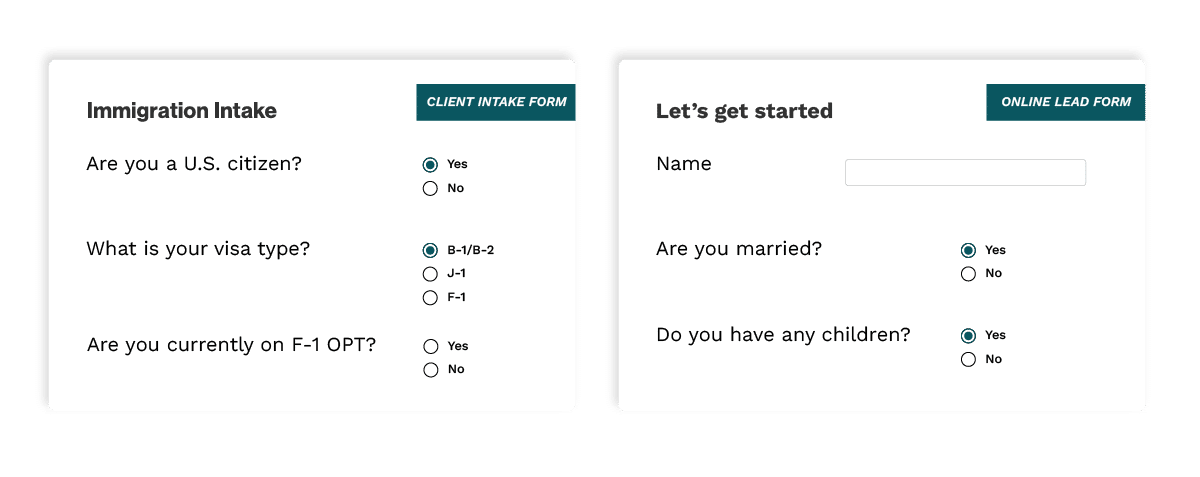Customer relationship management (CRM) applications are known for their ability to store client data, but the best CRM systems for lawyers accomplish more than data storage. They also drive revenue and referral business by improving lead conversions, client satisfaction, team collaboration, and marketing effectiveness.
Let’s explore these CRM benefits in more detail, define the features to look for in your legal client relationship management software, and outline the process for choosing the right application for your firm.
Key takeaways:
Legal CRMs that support dynamic lead and intake forms create better customer experiences.
Cloud-based legal practice CRMs for law firms must use bank-grade encryption for stored and transmitted data.
The best legal CRM software integrates seamlessly with the firm’s practice management system.
What Is Legal CRM Software?
Attorneys using legal CRM software can effectively track, manage, and engage with leads to improve the firm’s conversion rate. Let’s define these terms:
Leads are prospective clients who have shown interest in retaining the firm. Leads are also called prospects.
Conversion rate is the percentage of leads that sign as clients. A rising conversion rate produces more signed clients without spending more on marketing.
Legal CRM applications allow your team to create personalized experiences that provide your leads with the right information at the right time—this is a proven strategy for higher conversions. For example, new leads may want to know the firm’s background and the team’s experience with their case type. Seasoned leads, including those who have completed a consultation, may need contact information for existing client references before they are ready to sign an agreement.
A premier legal CRM provides the framework to structure and automate those experiences.
A premier legal CRM provides the framework to structure and automate experiences based on a lead's engagement and current status.
Why Should Law Firms Use CRMs?
Four primary benefits of using a legal CRM are: efficient lead generation and tracking, better client experiences, improved team collaboration, and more effective marketing strategies. We’ll review each of these benefits below.
1. Efficient Lead Generation and Tracking
With the right technology, you can grow your firm with lead tracking. CRMs track attorney leads in a centralized location, starting from their first interaction with your firm. This first interaction is often the completion of a contact form on the firm’s website, which is recorded and tracked automatically—there is no need to copy the lead’s information into a separate system.
In this example, the CRM powers the form, which in turn enables lead identification and tracking. The best CRMs for law firms support dynamic lead forms, which are also called conditional forms. These allow questions to be shown or hidden based on the lead’s prior responses. As a result, the form is efficient and customized to the individual’s situation. Short, intuitive forms encourage more leads than long, cumbersome forms.
CRMs should also provide staged lead tracking, which shows where the lead is within the conversion process. Firms should have visibility into leads at any stage, from initial information requests to pending contract signatures. Understanding these stages and their durations enables more accurate financial projections. You will also have the data needed to devise strategies for shortening the firm’s client conversion process.
CRMs should also provide staged lead tracking, which shows where the lead is within the conversion process.
2. Better Client Experiences
The best CRM software for law firms will enable open and fluid communication with leads, both before and after conversion. MyCase CRM, for example, offers several features that support lead and client interactions, all of which are tracked within the application. These features for exceptional client management include:
Integration with virtual receptionist services, so all calls are answered
Built-in text messaging for private, secure conversations that cannot be overheard
An online client portal where clients can ask questions, file and view paperwork, and pay their fees
3. Improved Team Collaboration
When the firm has a centralized CRM repository for lead information, every authorized team member can see and support the conversion process. Those involved in lead follow-up will know what tasks are pending. Additionally, those involved in new cases will also know what work assignments may be coming their way. With this shared view, team members can easily collaborate to grow and retain clients.
4. More Effective Marketing Strategies
Once your firm starts tracking leads, the team can also track and test the effectiveness of the firm’s marketing efforts. The first step is to start asking leads how they heard about your firm. From there, you can test different campaigns to understand how they affect lead generation and conversion. Learnings from those tests should improve the firm’s overall marketing effectiveness.
What Features Should You Look for in a CRM for Law Firms?
Below are six features to demand from your legal client relationship management software.
1. Dynamic Lead and Client Intake Forms
The most effective legal CRM systems include forms that can be published on the law firm’s website—so leads can reach the firm at any hour.
The most effective legal CRM systems include forms that can be published on the law firm's website-so leads can reach the firm at any hour.
Dynamic forms are ideal because they are easier to complete than static forms. As noted, dynamic forms only show necessary questions based on the information you already know about that individual. This eliminates repetitive or irrelevant information requests.
The MyCase’s CRM for law firms support dynamic lead and intake forms. Lead and intake forms work together to create accurate client records as efficiently as possible.
Look for a CRM that allows clients to view, select, and schedule available appointment times with your team.
2. Appointment Scheduling
When prospects are ready to make an appointment with your team, they should be able to without the back-and-forth of email scheduling. Look for a CRM that allows clients to view, select, and schedule available appointment times with your team.
You may also want to find a system that integrates with legal chatbots that can schedule appointments and answer common questions.

3. Workflow Automation
Premier CRMs include a workflow system that automates redundant, non-billable tasks. This way, you and your team can define unique triggers to create tasks, events, or documents for leads in any stage of the conversion or legal intake process.
See the table below for examples of how you can use the elements of workflows to manage leads and client intake efficiently.
Trigger | Action | Timing |
Lead completes a form for the first time. | 1. Send the lead an email outlining next steps and requesting a consultation. 2. Assign lead follow-up to a team member. | Immediately |
Lead attends a consultation. | 1. Create a task for the lawyer to draft an engagement agreement from an existing template. 2. Send a follow-up email to communicate the documentation timeline to the lead. | Immediately |
The best legal CRM software will also allow your team to create reusable templates for routine administrative documents. These templates can then be incorporated into the firm’s CRM workflows.
4. eSignatures
New case paperwork can be finalized more efficiently when the firm’s CRM supports eSignatures. Digital signing eliminates printing, scanning, and emailing busywork for clients and the firm. It also expedites onboarding so the team can begin work on the client’s case right away.
5. Client Portal
A client portal for law firms consolidates essential case information online so clients can access it any time. A comprehensive portal should include case milestones, team contact information, and documents. Look for a portal that also allows the firm to send invoices that clients can pay online.
Ideally, the CRM creates the portal automatically when the client signs an engagement agreement and pays any upfront fees. Since the portal information is pulled from the digital case file, there is no added work required from your team.
6. Data Analysis
A metrics dashboard is the feature that separates great legal CRMs from marginal ones. With access to metrics, your team can analyze and improve on marketing efforts, lead management, and client intake processes.
MyCase CRM metrics, for example, quantify lead success for any timeline and the conversion success of specific law firm marketing strategies. That data empowers you to make informed decisions about how to spend the firm’s marketing budget going forward. You may also uncover easy opportunities to improve your firm’s conversion rate.
A metrics dashboard is the feature that separates great legal CRMs from marginal ones.
5 Steps for Choosing the Best CRM for Law Firms
To choose the best CRM for your law firm, you must know your budget and your goals. You should also consider your firm’s current software stack because your team will generate more efficiencies with an integrated solution. Compliance, security, customizability, and scalability of the CRM are also factors.
1. Determine Your Budget
Legal CRMs can be expensive, but the benefits of the software often outweigh the costs. Your team should have a lower administrative burden, and the firm should begin generating and converting more leads after implementation.
2. Identify Your Goals and the Problems You Need to Solve
Every law firm has pain points related to lead generation. Perhaps your firm is not generating enough leads or not converting the leads that come in. Identify the firm’s most pressing issues related to lead management and client intake, then find a legal CRM that solves those problems.
If lead generation is lacking, you may need a system that can publish dynamic lead forms on the firm’s website. If leads are not converting, you may need a CRM that supports custom workflows to organize lead follow-up.
3. Consider Your Existing Software and Integrations
Lead management and intake integration with your practice management solution is a must. This eliminates error-prone manual data entry that can affect the client experience and case outcomes.
4. Check Compliance and Security Safeguards
CRMs contain personal information, which means you cannot risk a data breach. Verify that any prospective cloud-based legal practice CRM for law firms uses bank-grade encryption on stored and transmitted information. You may also want a system that allows for individual access control, so you can control which team members have access to sensitive client data.
5. Look for Customizability and Scalability
Legal CRMs must allow for customization and scalability, so you can shape the system to meet the firm’s needs as it grows. For example, you will want to customize workflows and add lead and client entries as needed.
It is also important to implement a solution that evolves with industry best practices. Static systems become outdated quickly. An application like MyCase that continually adds new features will continue to provide the most innovative lead management and intake practices.
Get Started with MyCase: The Best CRM for Lawyers
With MyCase, your team and clients will benefit from the best CRM capabilities paired seamlessly with practice management features. Team members can work in one system, and client data will not get lost or recorded incorrectly via manual data entry processes. Less time spent on administrative tasks creates more time for billable casework.
Additional features of MyCase include:
Try MyCase today risk-free with a 10-day free trial. We offer affordable monthly and yearly subscriptions. Plus, no commitment or credit card is required, and you can cancel at any time.
Frequently Asked Questions
About the author

Catherine BrockContent Writer
Catherine Brock is a Content Writer for leading legal software companies, including MyCase, Docketwise, and CASEpeer, as well as LawPay, the #1 legal payment processor. She covers emerging legal technology, financial wellness for law firms, the latest industry trends, and more.
